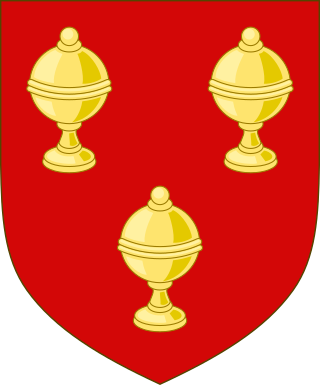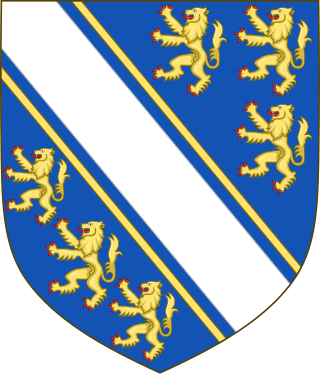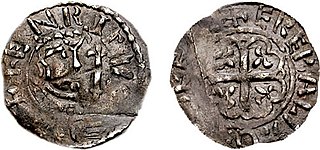| | | | | | | | Robert
1000–1035
Duke of Normandy |
|
| | | | | | | | | | | | | | | | |
| | | | |
| | | | | | | | Adelaide of Normandy
c. 1030–before 1090
Countess of Aumale | | William the Conqueror
c. 1028–1087
King of England |
|
| | | | Earl of Huntingdon (1st creation), 1065
Earl of Northampton (1st creation), 1071 | | | | | |
|
| | | | Waltheof
d. 1076
Earl of Northumbria, 1st Earl of Huntingdon, 1st Earl of Northampton | | Judith of Lens
1054/1055–c. 1090, 2nd Earl of Huntindon |
| |
| | | | | | | | | | |
| | | |
| | | | Maud
c. 1074–1130
3rd Countess of Huntingdon, 2nd Countess of Northampton
Queen of Scotland | | Simon I de Senlis
d. 1111–1113
3rd Earl of Huntingdon, 2nd Earl of Northampton jure uxoris |
| |
| | | | | | | | | | |
| | | |
| | | | Simon II de Senlis
c. 1098–1153
4th Earl of Huntingdon, 3rd Earl of Northampton |
|
| | | | | | | |
|
| | | | Simon III de Senlis
c. 1138–1184
5th Earl of Huntingdon, 4th Earl of Northampton |
|
| | | | Earldom of Northampton (1st creation) reverted to the Crown, 1184 |
|
| Earl of Northampton (2nd creation), 1337 |
|
William de Bohun
c. 1312 – 1373
Earl of Hereford, Earl of Essex, 1st Earl of Northampton | | | | | | Edward III
1312–1377
King of England |
|
| | | | | | | | | | | | | | | | | | |
| | | | | | | | | |
Humphrey de Bohun
1342–1373
Earl of Hereford, Earl of Essex, 2nd Earl of Northampton | | John of Gaunt
1340–1399
Duke of Lancaster | | | | | | Thomas of Woodstock
1355–1397
Duke of Gloucester |
|
| Earldom of Northampton (2nd creation) abeyant, 1373 | | | | | | | | | | | | | | |
|
| | | | Earl of Northampton (2nd creation restored), 1384 | | | | | | Earl of Northampton (3rd creation), 1399 |
|
| | | | Henry Bolingbroke
c. 1367 – 1413
Earl of Northampton, later King Henry IV | | | | | | Anne of Gloucester
1383–1438
Countess of Northampton |
|
| | | | Earldom of Northampton (2nd creation) merged in the crown, 1399 | | | | | | Earldom of Northampton (3rd creation) extinct, 1438 |
|
| | | | | | | | Earl of Huntingdon (7th creation), 1529 |
|
| | | | | | | | George Hastings
1488–1544
1st Earl of Huntingdon |
|
| | | | | | | | | | | | | | | | | | | | |
| | | | | | | | |
| | | | | | | | | | | | | | | | | Baron Hastings of Loughborough, 1558 |
|
| | | | | | | | Francis Hastings
1514–1561
2nd Earl of Huntingdon | | | | | | Edward Hastings
c. 1521–1572
Baron Hastings of Loughborough |
|
| | | | | | | | | | | | | | | | | Barony Hastings of Loughborough extinct, 1572 |
|
| Earl of Northampton, (4th creation), 1604 | | Baron Compton, 1572 | | | | | | | | | | | | | | | | | | |
| | | | | | | | | | | | | | |
Henry Howard
1540–1614
Earl of Northampton | | Henry Compton
1544–1589
1st Baron Compton | | Frances Anne Hastings
1533–1574 | | Henry Hastings
1536–1595
3rd Earl of Huntingdon | | George Hastings
1540–1604
4th Earl of Huntingdon | | Edward Hastings
1541–1603 |
| |
| Earldom of Northampton (4th creation) extinct, 1614 | | | | | | | | | | | | | | | | | | | | |
| | | |
| | | | Earl of Northampton (5th creation), 1618 | | | | | | | | | | | | | | |
|
| | | | William Compton
d. 1630
1st Earl of Northampton, 2nd Baron Compton | | | | | | Francis Hastings
1560–1595 | | Henry
c. 1555–1640 |
|
| | | | | | | | | | | | | | | | | | | | | |
|
| | | | | | | | | | | | | Henry Hastings
1586–1643
5th Earl of Huntingdon | | | | | |
|
| | | | | | | | | | | | | | | | | | | | | |
|
| | | | Spencer Compton
1601–1643
2nd Earl of Northampton, 3rd Baron Compton | | | | | | Ferdinando Hastings
1609–1656
6th Earl of Huntingdon | | Henry
b. 1605 |
|
| | | | | | | | | | | | | | | | | | | | | |
|
| | | | James Compton
1622–1681
3rd Earl of Northampton, 4th Baron Comptonric | | | | | | Theophilus Hastings
1650–1701
7th Earl of Huntingdon | | Richard
1645–1714 |
|
| | | | | | | | | | | | | | | | | | | | | | | |
| | | | | | | | | | | |
| | | | | Baron Wilmington, 1728
Earl of Wilmington and Viscount Pevensey, 1730 | | | | | | | | | | | | | | | |
|
George Compton
1664–1727
4th Earl of Northampton, 5th Baron Compton | | Spencer Compton
c. 1674 – 1743
Earl of Wilmington, Viscount Pevensey, Baron Wilmington | | George Hastings
1677–1705
8th Earl of Huntingdon | | | | | | | Henry
1701–1786 |
|
| | | | | Earldom of Wilmington, Vicountcy Pevensey, and Barony Wilmington extinct, 1743 | | | | | | | | | | | | | | |
|
| | | | | | | | | | | | | | | | | | | | | | |
| | | | | | | | | |
James Compton
1687–1754
5th Earl of Northampton, 6th Baron Compton | | George Compton
1692–1758
6th Earl of Northampton, 7th Baron Compton | | Charles Compton | | Theophilus Hastings
c. 1696–1746
9th Earl of Huntingdon | | | | | |
|
| | | | | | | | | | | | | | | | | | | | | | | | | | | |
| | | | |
Charlotte Townshend
d. 1770
Viscountess Townshend, Baroness Ferrers of Chartley, 7th Baroness Compton | | | | | | Charles Compton
1737–1763
7th Earl of Northampton | | Francis Hastings
1729–1789
10th Earl of Huntingdon | | Theophilus Hastings
1728–1804
11th Earl of Huntingdonde jure | | George
1735–1802 |
|
| | | | | | | | | | | | | | | | | | Earldom of Huntingdon dormant/abeyant, 1804 | | | | | |
|
George Townshend
1753–1811
Marquess Townshend, Earl of Leicester, Viscount Townshend, Baron Townshend, Baron Ferrers of Chartley, 8th Baron Compton | | | | | | Spencer Compton
1760–1828
8th Earl of Northampton | | | | | | | | | | | | | |
|
| | | | | | | | | | | | | | | | | | | | | | | | | |
|
| | | | | | | | | Marquess of Northampton (2nd creation), Earl Compton and Baron Wilmington, 1812 | | | | | | | | | | Earldom of Huntingdon claim restored, 1819 |
|
George Townshend
(1778–1885)
Marquess Townshend, Earl of Leicester, Viscount Townshend, Baron Townshend, Baron Ferrers of Chartley, 9th Baron Compton | | | | | | Charles Compton
1760–1828
1st Marquess of Northampton, 9th Earl of Northampton, 1st Earl Compton, 1st Baron Wilmington | | | | | | | | | | Hans "Francis" Hastings
1779–1828
12th Earl of Huntingdon |
|
| Barony Compton abeyant, 1855 | | | | | | | | | | | | | | | | | | | | | | | |
| | | | | |
| | | | | | | | Spencer Joshua Alwyne Compton
1790–1851
2nd Marquess of Northampton, 2nd Earl Compton, 2nd Baron Wilmington | | | | | | | | | | | | | | |
|
| | | | | | | | | | | | | | | | | | | | | | | | | | |
| | | | | |
| | | | Charles Douglas-Compton
1816–1877
3rd Marquess of Northampton, 3rd Earl Compton, 3rd Baron Wilmington | | William Compton
1818–1897
4th Marquess of Northampton, 4th Earl Compton, 4th Baron Wilmington | | | | | | Francis Theophilus Henry Hastings
1808–1875
13th Earl of Huntingdon | | George
1814–1876 |
|
| | | | | | | | | | | | | | | | | | | | | | | | | |
|
| | | | | | | | | | | | | | | | | Francis Power Plantagenet Hastings
1841–1885
14th Earl of Huntingdon | | | | | |
|
| | | | | | | | | | | | | | | | | | | | | | | | | | |
| | | | | |
| | | | | | | | William George Spencer Scott Compton
1851–1913
5th Marquess of Northampton, 5th Earl Compton, 5th Baron Wilmington | | Warner Francis John Plantagenet Hastings
1868–1939
15th Earl of Huntingdon | | Aubrey
1878–1929 | | Hans
1865–1933 |
|
| | | | | | | | | | | | | | | | | | | | | | | | | | |
|
| | | | | | | | William Bingham Compton
1885–1978
6th Marquess of Northampton, 6th Earl Compton, 6th Baron Wilmington | | Francis John Clarence Westenra Plantagenet Hastings
1901–1990
16th Earl of Huntingdon | | Peter Hastings-Bass
1920–1964 | | George
1905–1981 |
|
| | | | | | | | | | | | | | | | | | | | | | | | | | |
| | | | | |
| | | | | | | | Spencer Douglas David Compton
b. 1946
7th Marquess of Northampton, 7th Earl Compton, 7th Baron Wilmington | | William Edward Robin Hood Hastings-Bass
b. 1948
17th Earl of Huntingdon | | John
b. 1954 | | George
1938–2005 |
|
| | | | | | | | | | | | | | | | | First heir presumptive to the Earldom of Huntingdon | | | | | |
|
| | | | | | | | Daniel Bingham Compton
b. 1973
styled Earl Compton | | | | | | | | | | Adam
b. 1977 |
|
| | | | | | | | | | | | | | | | | | | | Second Heir presumptive to the Earldom of Huntingdon |
|









